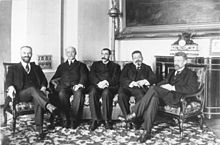Otto Landsberg
| Otto Landsberg | |
|---|---|

Council of the People's Deputies: Otto Landsberg (left) with Philipp Scheidemann, Gustav Noske, Friedrich Ebert, Rudolf Wissell (December 1918)
|
|
| Born |
4 December 1869 Rybnick, German Empire |
| Died | 9 December 1957 (aged 88) Baarn, Netherlands |
Otto Landsberg (4 December 1869 – 9 December 1957) was a German jurist, politician and diplomat. He was a member of the revolutionary Council of the People's Deputies that took power during the German Revolution of 1918-19 and then served as Minister of Justice in the first democratically elected government of Germany in 1919. In that capacity, he also was a member of the German delegation that went to Versailles to receive the Allies' Treaty of Versailles.
Landsberg was born on 4 December 1869 in Rybnick in the Province of Silesia, to a Jewish family. His father was a medical doctor. After passing the Abitur in 1887 in Ostrowo, he moved to Berlin to study law. In 1895, having passed the First (1890) and Second State Examination (1895), he opened a lawyer's office in Magdeburg and made a name for himself as a trial lawyer.
Having joined the SPD in 1890, Landsberg was a member of the Magdeburg city council from 1903 to 1909. After failing to get elected for Schwarzburg-Sondershausen in 1907, in 1912, Landsberg succeeded in becoming the Reichstag delegate for Magdeburg. Since there were no elections during World War I, he held the seat until 1918.
In May 1912, as a freshman, he refused to leave the chamber with the rest of the SPD for the Kaiserhoch (a cheer for the Emperor) but stood up for it, ignoring party tradition. Landsberg's numerous Reichstag speeches subsequently showed him to be an excellent speaker. During World War I, he supported the policies of the majority of the SPD parliamentary group, opposing Karl Liebknecht and Hugo Haase. After they had left the party fraction in 1916, Landsberg became even more prominent since he was one of only a few jurists remaining. Of a nationalistic bent, he approved of the war loans and argued in favour of the territorial integrity of the Reich, including Alsace-Lorraine, but he opposed German annexion of additional territory. He repeatedly demanded domestic reforms, including "democratisation" and changes to the election laws of Prussia and the Reich.
...
Wikipedia
